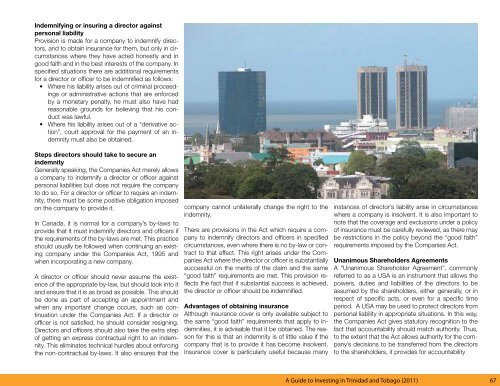A Guide to Investing in Trinidad and Tobago (2011) - Ministry of ...
A Guide to Investing in Trinidad and Tobago (2011) - Ministry of ...
A Guide to Investing in Trinidad and Tobago (2011) - Ministry of ...
Create successful ePaper yourself
Turn your PDF publications into a flip-book with our unique Google optimized e-Paper software.
Indemnify<strong>in</strong>g or <strong>in</strong>sur<strong>in</strong>g a direc<strong>to</strong>r aga<strong>in</strong>st<br />
personal liability<br />
Provision is made for a company <strong>to</strong> <strong>in</strong>demnify direc<strong>to</strong>rs,<br />
<strong>and</strong> <strong>to</strong> obta<strong>in</strong> <strong>in</strong>surance for them, but only <strong>in</strong> circumstances<br />
where they have acted honestly <strong>and</strong> <strong>in</strong><br />
good faith <strong>and</strong> <strong>in</strong> the best <strong>in</strong>terests <strong>of</strong> the company. In<br />
specified situations there are additional requirements<br />
for a direc<strong>to</strong>r or <strong>of</strong>ficer <strong>to</strong> be <strong>in</strong>demnified as follows:<br />
• Where his liability arises out <strong>of</strong> crim<strong>in</strong>al proceed<strong>in</strong>gs<br />
or adm<strong>in</strong>istrative actions that are enforced<br />
by a monetary penalty, he must also have had<br />
reasonable grounds for believ<strong>in</strong>g that his conduct<br />
was lawful.<br />
• Where his liability arises out <strong>of</strong> a “derivative action”,<br />
court approval for the payment <strong>of</strong> an <strong>in</strong>demnity<br />
must also be obta<strong>in</strong>ed.<br />
Steps direc<strong>to</strong>rs should take <strong>to</strong> secure an<br />
<strong>in</strong>demnity<br />
Generally speak<strong>in</strong>g, the Companies Act merely allows<br />
a company <strong>to</strong> <strong>in</strong>demnify a direc<strong>to</strong>r or <strong>of</strong>ficer aga<strong>in</strong>st<br />
personal liabilities but does not require the company<br />
<strong>to</strong> do so. For a direc<strong>to</strong>r or <strong>of</strong>ficer <strong>to</strong> require an <strong>in</strong>demnity,<br />
there must be some positive obligation imposed<br />
on the company <strong>to</strong> provide it.<br />
In Canada, it is normal for a company’s by-laws <strong>to</strong><br />
provide that it must <strong>in</strong>demnify direc<strong>to</strong>rs <strong>and</strong> <strong>of</strong>ficers if<br />
the requirements <strong>of</strong> the by-laws are met. This practice<br />
should usually be followed when cont<strong>in</strong>u<strong>in</strong>g an exist<strong>in</strong>g<br />
company under the Companies Act, 1995 <strong>and</strong><br />
when <strong>in</strong>corporat<strong>in</strong>g a new company.<br />
A direc<strong>to</strong>r or <strong>of</strong>ficer should never assume the existence<br />
<strong>of</strong> the appropriate by-law, but should look <strong>in</strong><strong>to</strong> it<br />
<strong>and</strong> ensure that it is as broad as possible. This should<br />
be done as part <strong>of</strong> accept<strong>in</strong>g an appo<strong>in</strong>tment <strong>and</strong><br />
when any important change occurs, such as cont<strong>in</strong>uation<br />
under the Companies Act. If a direc<strong>to</strong>r or<br />
<strong>of</strong>ficer is not satisfied, he should consider resign<strong>in</strong>g.<br />
Direc<strong>to</strong>rs <strong>and</strong> <strong>of</strong>ficers should also take the extra step<br />
<strong>of</strong> gett<strong>in</strong>g an express contractual right <strong>to</strong> an <strong>in</strong>demnity.<br />
This elim<strong>in</strong>ates technical hurdles about enforc<strong>in</strong>g<br />
the non-contractual by-laws. It also ensures that the<br />
company cannot unilaterally change the right <strong>to</strong> the<br />
<strong>in</strong>demnity.<br />
There are provisions <strong>in</strong> the Act which require a company<br />
<strong>to</strong> <strong>in</strong>demnify direc<strong>to</strong>rs <strong>and</strong> <strong>of</strong>ficers <strong>in</strong> specified<br />
circumstances, even where there is no by-law or contract<br />
<strong>to</strong> that effect. This right arises under the Companies<br />
Act where the direc<strong>to</strong>r or <strong>of</strong>ficer is substantially<br />
successful on the merits <strong>of</strong> the claim <strong>and</strong> the same<br />
“good faith” requirements are met. This provision reflects<br />
the fact that if substantial success is achieved,<br />
the direc<strong>to</strong>r or <strong>of</strong>ficer should be <strong>in</strong>demnified.<br />
Advantages <strong>of</strong> obta<strong>in</strong><strong>in</strong>g <strong>in</strong>surance<br />
Although <strong>in</strong>surance cover is only available subject <strong>to</strong><br />
the same “good faith” requirements that apply <strong>to</strong> <strong>in</strong>demnities,<br />
it is advisable that it be obta<strong>in</strong>ed. The reason<br />
for this is that an <strong>in</strong>demnity is <strong>of</strong> little value if the<br />
company that is <strong>to</strong> provide it has become <strong>in</strong>solvent.<br />
Insurance cover is particularly useful because many<br />
<strong>in</strong>stances <strong>of</strong> direc<strong>to</strong>r’s liability arise <strong>in</strong> circumstances<br />
where a company is <strong>in</strong>solvent. It is also important <strong>to</strong><br />
note that the coverage <strong>and</strong> exclusions under a policy<br />
<strong>of</strong> <strong>in</strong>surance must be carefully reviewed, as there may<br />
be restrictions <strong>in</strong> the policy beyond the “good faith”<br />
requirements imposed by the Companies Act.<br />
Unanimous Shareholders Agreements<br />
A “Unanimous Shareholder Agreement”, commonly<br />
referred <strong>to</strong> as a USA is an <strong>in</strong>strument that allows the<br />
powers, duties <strong>and</strong> liabilities <strong>of</strong> the direc<strong>to</strong>rs <strong>to</strong> be<br />
assumed by the shareholders, either generally, or <strong>in</strong><br />
respect <strong>of</strong> specific acts, or even for a specific time<br />
period. A USA may be used <strong>to</strong> protect direc<strong>to</strong>rs from<br />
personal liability <strong>in</strong> appropriate situations. In this way,<br />
the Companies Act gives statu<strong>to</strong>ry recognition <strong>to</strong> the<br />
fact that accountability should match authority. Thus,<br />
<strong>to</strong> the extent that the Act allows authority for the company’s<br />
decisions <strong>to</strong> be transferred from the direc<strong>to</strong>rs<br />
<strong>to</strong> the shareholders, it provides for accountability<br />
A <strong>Guide</strong> <strong>to</strong> <strong>Invest<strong>in</strong>g</strong> <strong>in</strong> Tr<strong>in</strong>idad <strong>and</strong> <strong>Tobago</strong> (<strong>2011</strong>) 67


